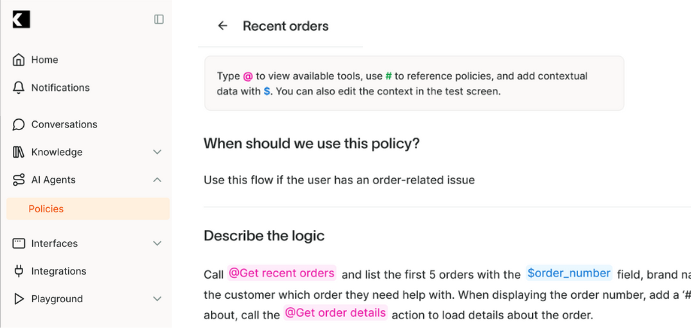Ingredients
The systems utilized by this policy include Skio, Salesforce Service Cloud, and Kodif.
What are AI Policies?

At Kodif, we’re excited to announce the launch of Policies—a powerful, dynamic solution designed to revolutionize the way CX managers handle customer support. Unlike traditional flows, which are rigid and complex, Policies empower non-technical users to create and manage customer interactions with ease. Written in natural language, Policies make it simple to define and refine customer experiences without needing to rely on complicated flowcharts or scripting. This approach is not only user-friendly but also self-serve, enabling CX teams to quickly translate existing Standard Operating Procedures (SOPs) into automation, saving valuable time and resources.
The flexibility of Kodif Policies ensures that businesses can offer personalized, context-driven support while continuously improving customer experiences. With Policies, you can experiment with different strategies to optimize outcomes such as CSAT, revenue, and retention—all without the need to rebuild complex workflows. Whether it’s automating routine interactions or testing new approaches for high-stakes scenarios, Policies provide a scalable, adaptable solution that aligns with your business goals. While flows still have their place in sensitive, high-risk situations, Policies offer an agile alternative that helps businesses innovate faster and deliver exceptional, tailored experiences at scale.
“Restart subscription” ticket type explained
In customer support, a “Restart subscription” ticket type refers to a process where customers who have previously canceled or paused their subscriptions wish to reactivate them. This type of ticket is crucial for maintaining customer relationships and boosting lifetime value by providing a seamless way for subscribers to return. Handling these tickets efficiently involves verifying the customer’s identity, understanding the reason for the restart, and ensuring that the subscription terms align with current offerings. By automating this process, companies can improve customer satisfaction and retention while minimizing the workload on support teams.
Which Platforms does this AI policy work on?
This AI policy works seamlessly on Skio, Salesforce Service Cloud, and Kodif. Additionally, Kodif integrates with all other major platforms, offering flexibility and adaptability across various systems.
When should I use this policy?
You should use this policy when customers want to cancel orders, and the process calls for a retention step. This approach helps to retain customers by offering them incentives or alternatives that encourage them to maintain their subscription or order rather than cancel it entirely.
Policy logic
Type @ to view available tools, use # to reference policies, and add contextual data with $. You can also edit the context in the test screen.
- Customer wants to proceed with the cancellation in the #Single_order_cancellation_policy – Provide Cancellation Alternatives.
- Once the order is selected, offer retention options to prevent cancellation:
- Discount Offer: Use @set_discount_to_order to offer a discount (e.g., 10% or 15%) on the current order if the user chooses to retain it.
- Shipping Upgrade: Offer an expedited shipping upgrade free of charge to incentivize the user to keep their order.
- Product Swap: Offer the option to swap the item for another product of the same or higher value at no extra cost.
- Future Discount: Offer a discount for a future purchase, e.g., a 20% coupon for their next order, if they keep the current order.
- Confirm Retention Decision
- Ask the user if they are interested in one of the retention options.
- If the user accepts:
- Apply the agreed-upon retention offer using the relevant tools (@set_discount_to_order, @upgrade_shipping, or other applicable retention tools).
- Inform the user that the order has been updated, and provide them with the relevant details (e.g., new discount, shipping upgrade, etc.).
- Use @send_async_message(message: str) to notify the user that their order has been successfully updated with the retention offer.
- Salesforce will also send a confirmation email detailing the order update.
- If the user declines:
- Proceed with the order cancellation as described in the #Single_order_cancellation_policy.
- Post-Retention Follow-up:
- If the user accepts the retention offer, thank them for choosing to keep their order and reiterate any benefits or bonuses (e.g., a future discount).
- Ensure the user receives a follow-up message confirming that their retention offer has been applied.
- Escalation:
- If the user has any additional concerns or issues regarding the retention offer, route the case to an agent for further assistance.
- In cases where the user insists on canceling despite the retention offers, proceed with cancellation as outlined in the cancellation policy.
Example policy
When should we use this policy? Use this policy when customers want to cancel orders and the process calls for a retention step.
Describe the logic Type @ to view available tools, use # to reference policies, and add contextual data with $. You can also edit the context in the test screen.
- Customer wants to proceed with the cancellation in the #Single_order_cancellation_policy – Provide Cancellation Alternatives.
- Once the order is selected, offer retention options to prevent cancellation:
- Discount Offer: Use @set_discount_to_order to offer a discount (e.g., 10% or 15%) on the current order if the user chooses to retain it.
- Shipping Upgrade: Offer an expedited shipping upgrade free of charge to incentivize the user to keep their order.
- Product Swap: Offer the option to swap the item for another product of the same or higher value at no extra cost.
- Future Discount: Offer a discount for a future purchase, e.g., a 20% coupon for their next order, if they keep the current order.
- Confirm Retention Decision
- Ask the user if they are interested in one of the retention options.
- If the user accepts:
- Apply the agreed-upon retention offer using the relevant tools (@set_discount_to_order, @upgrade_shipping, or other applicable retention tools).
- Inform the user that the order has been updated, and provide them with the relevant details (e.g., new discount, shipping upgrade, etc.).
- Use @send_async_message(message: str) to notify the user that their order has been successfully updated with the retention offer.
- Salesforce will also send a confirmation email detailing the order update.
- If the user declines:
- Proceed with the order cancellation as described in the #Single_order_cancellation_policy.
- Post-Retention Follow-up:
- If the user accepts the retention offer, thank them for choosing to keep their order and reiterate any benefits or bonuses (e.g., a future discount).
- Ensure the user receives a follow-up message confirming that their retention offer has been applied.
- Escalation:
- If the user has any additional concerns or issues regarding the retention offer, route the case to an agent for further assistance.
- In cases where the user insists on canceling despite the retention offers, proceed with cancellation as outlined in the cancellation policy.


